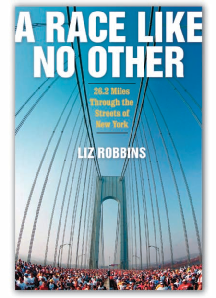A Race Like No Other by Liz Robbins '92 (Harper)
A Race Like No Other by Liz Robbins '92 (Harper)
Y ou can feel the pain and exhilaration of every mile in sportswriter Liz Robbins's account of the 2007 New York City Marathon. People run for many reasons. Top professionals Martin Lel, Abderrahim Goumri, Hendrick Ramaala, Paula Radcliffe, Gete Wami, and Jelena Prokopcuka compete to break the tape, while amateurs like Harrie Bakst, a young cancer survivor, and Pam Rickard, a recovering alcoholic, come to outrun their diagnoses or their demons. "Distance running is a pastime uniquely suited to introspection," Robbins writes. "To run is to question why. To run the New York City Marathon is to discover the answer."
ou can feel the pain and exhilaration of every mile in sportswriter Liz Robbins's account of the 2007 New York City Marathon. People run for many reasons. Top professionals Martin Lel, Abderrahim Goumri, Hendrick Ramaala, Paula Radcliffe, Gete Wami, and Jelena Prokopcuka compete to break the tape, while amateurs like Harrie Bakst, a young cancer survivor, and Pam Rickard, a recovering alcoholic, come to outrun their diagnoses or their demons. "Distance running is a pastime uniquely suited to introspection," Robbins writes. "To run is to question why. To run the New York City Marathon is to discover the answer."




The Unthinkable by Amanda Ripley '96 (Crown). While disasters often bring to mind panic, destruction, and the efforts of professional rescuers, ordinary people tend to perform well and save one another. "Reality is a lot more interesting—and hopeful," writes Ripley, a senior writer for Time. She analyzes human behavior in such disasters as the 9/11 attack on the World Trade Center, Hurricane Katrina, the 2004 tsunami, and the Virginia Tech shootings. "If we get to know our disaster personalities before the disaster, we might have a slightly better chance of surviving."
America's Midlife Crisis by Gary R. Weaver and Adam Mendelson '04 (Intercultural Press). "The security that Americans felt after the end of the Cold War disappeared within hours with the collapse of the two towers at the World Trade Center," write Weaver, executive director of the Intercultural Management Institute, and Mendelson, managing editor of the Middle East Journal. The authors examine American culture and politics since 9/11 and argue that the real test of U.S. exceptionalism will be whether individual liberties and democratic principles can withstand the fear of terrorism.
Dark Banquet by Bill Schutt, PhD '95 (Harmony). There are real vampires. In fact, thousands of species feed on blood. Vampire bats, leeches, bed bugs, ticks, fleas, chiggers, and mites are the best-known sanguivores. But there are also strange blood-feeders like vampire moths, vampire finches from the Galápagos Islands, and the candiru, a tiny catfish found in the Amazon. Some creatures are nuisances, while others can transmit bubonic plague, rabies, Lyme disease, or Rocky Mountain spotted fever. Schutt, an associate professor of biology at C. W. Post College, uncloaks his subject with macabre wit.
Sex, Love, and Fashion by Bruce Hulse '74, BA '76 (Harmony). Bruce Hulse chronicles his experience as a top male model in the Eighties and Nineties, when he appeared in hundreds of ads, posed for the covers of GQ and Mademoiselle, and worked with Elle Macpherson, Paulina Porizkova, and Andie MacDowell. Even though he moved in a glamorous world, his life was often lonely, and he struggled to find a spiritual center. Proving the adage that the road of excess leads to the palace of wisdom, Hulse now enjoys life as a husband, father, photographer, and writer.
Recently Published
Poetry
Burn and Dodge by Sharon Dolin '77, PhD '90 (Pittsburgh). An award-winning fourth collection by a poet in residence at Eugene Lang College at the New School for Liberal Arts.
Children's
Whistling Wings by Laura Goering, PhD '89, illustrated by Laura Jacques (Sylvan Dell). A professor of Russian at Carleton College recounts the adventures of a young tundra swan during his first migration.
Nonfiction
Red Land, Red Power by Sean Kicummah Teuton, PhD '02 (Duke). An associate professor of English and American Indian studies at the University of Wisconsin, Madison, shows how the Red Power American Indian movement grew "not out of romantic claims to a pure Indian past and culture, as often characterized in the mainstream, but rather through an ongoing encounter with the world as members sought to produce more enabling accounts of American Indian lives."
When War Becomes Personal edited by Donald Anderson, MFA '89 (Iowa). A professor of English, writer in residence, and editor of War, Literature, and the Arts at the Air Force Academy brings together soldiers' essays and memoirs from the Civil War to the war in Iraq.
African Cherokees in Indian Territory by Celia E. Naylor '88 (University of North Carolina). When the Cherokees, Creek, Choctaw, and Chickasaw were forcibly removed from their lands in the late 1830s, they brought their slaves with them on the Trail of Tears. Enslaved African Cherokees in Indian Territory experienced a different world of bondage than those enslaved by European Americans. Naylor, an assistant professor of history at Dartmouth, examines "the nuances of identity, the contradictions of belonging, and the complexities of bondage for people of African descent in Indian country."
The Curious Case of the Misplaced Modifier by Bonnie Trenga '91 (Writer's Digest). A professional copy editor and proofreader pinpoints seven common writing problems and shows how to fix them. The guide gives practical techniques for creating sentences that are not just grammatically correct, but also strong, concise, and specific.


